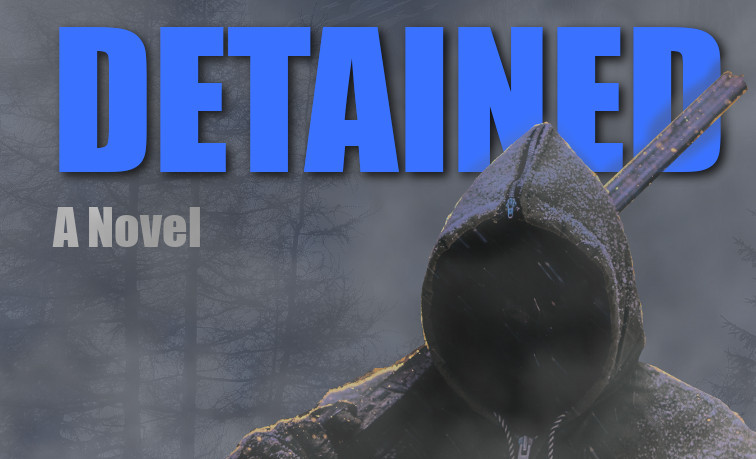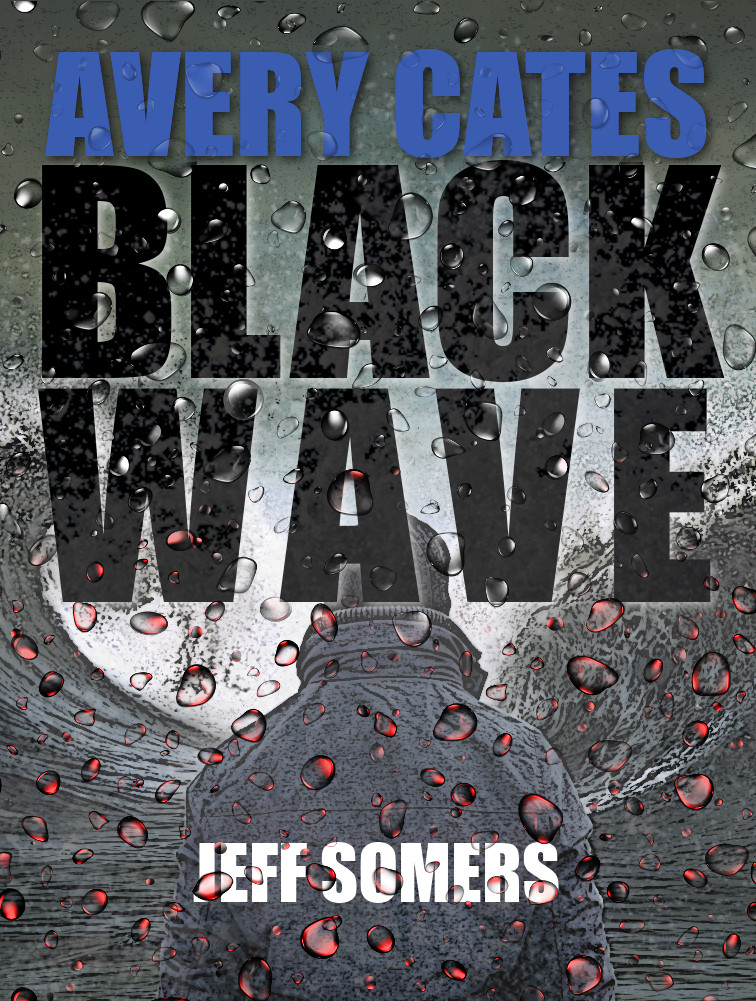Detained Chapter 48 (End)

I’ll be posting one chapter of my novel Detained every week throughout 2021. Download links below.
48. Candace
It was time for lunch. If her growling stomach wasn’t enough, her aching shoulders and stiff back took up the challenge and made it clear she’d worked long enough. She picked up a rag and wiped her hands, slumping slightly in her chair and eying the canvas critically. She still couldn’t quite see the painting, but she thought something was beginning to emerge.
She stood up and stretched. It was a sunny, clear day outside, so she’d opened up every blind and pulled aside every drape in the house to let in as much light as possible, and as a result had consented to wear a pair of paint-splattered overalls just in case some lost hunters wandered past the house. As usual when she let the light in, the house looked alien. Her father had liked things dark and dingy, private. She’d never realized just how dark and drab the house always was until she’d moved to New York.
She picked up her mug of coffee and carried it to the kitchen. The house was still her father’s. She kept meaning to plan some renovations, to modernize, but time always slipped away. She wanted to tear out the ancient kitchen with its narrow countertops and metal cabinets, she wanted to tear down a wall and install a master bath. She didn’t really have the money, but the place didn’t have a mortgage, so she thought she might get an equity line and do it that way.
Somehow, though, she woke up every morning and didn’t do a damn thing about it. She was starting to suspect she liked the house as it was, with her father’s imprint on it.
As she passed the pantry door in the kitchen she paused. With both hands on the mug, she stood very still and listened for a moment. Then she shook her head and kept walking.
The fridge only contained vegetables and a pitcher of water. This had seemed like a brilliant plan the day before, when she’d noticed an extra five pounds and a distressing tightness to her jeans. The market was a twenty-minute drive and she figured if all she had to eat in the house was salad and canned tuna, she would be forced to eat healthy. Or possibly not eat at all. Either way, her plan was to avoid the bathroom scale until Friday and then see what she had wrought.
Sighing, she gathered lettuce, a tomato, half an onion, and a cucumber and dumped them on the butcher block island. She got a bowl out of the cabinet over the sink, took a knife from the drawer, and began industriously and piously cutting up a chopped salad. When salad had been achieved, she wiped her hands on her grubby overalls and put the veggies back in the fridge.
Tuna, she thought. Dad would say I needed protein. Protein, caffeine, and beer, he always said, the most important food groups.
She smiled and steeled herself.
The pantry door stuck, and she had to put a little back into it to budge it open. It had always been that way. She leaned into it just like she had for thirty-two years, and the door scraped the floor and swung inward.
The pantry was a small room with metal shelves on each side, leaving a lane in the middle just big enough for a person to walk down. Candace paused and stared down at the trap door in the floor. Two steel bars and a padlock through an old iron hasp secured it. It led down into a tiny root cellar that they’d never used; it was just large enough for one person to be very uncomfortable in, and they’d never known what to do with the space anyway. She had a vague notion that you stored perishables in there in the times before refrigeration, but since she was living in the age of refrigeration, she didn’t see the point.
As she watched, the trap door shifted, just slightly, and a distant-sounding banging filtered up through the old floorboards. She stared at the trap for another moment, then turned and went back into the kitchen, closing the pantry door softly behind her.
####
The first glass of wine had been so relaxing she’d immediately proceeded to the second, and was seriously considering having nothing but cheese, wine, and streaming video for dinner when the phone vibrated. She watched it dance on the old warped picnic table set up in the backyard. She sat under the huge yellow umbrella and thought it was cool and soothing despite the humidity, but realized that might have been the wine. The wine had cost three dollars for the bottle and it was sweet and tasted like a headache tomorrow. Or in three hours.
When the phone stopped buzzing, she picked it up, thumbed it onto speaker, and played the message. A second later, Mike’s voice, tinny and distant.
Hey Cuddyer, he said, and she smiled. Just checking in on you. Had a moment of deja vu in an elevator this morning and almost went into a full-on panic attack. Half expected to close my eyes and open them seven years ago, you know? Anyway, that made me think of you, so I thought I’d say hey. Thinking of coming up to Manhattan again? Do. The invitation stands. Will always stand.
She sipped wine. She missed Mike. But not, she thought, in a romantic way; whatever option for romance there had once been between them had been replaced with an almost filial affection, dry and careful. She and Mike were linked. She would carry him with her for the rest of her life, but she wasn’t sure she ever needed to see him again.
I also obviously want to leave the millionth message regarding your charge. You can’t keep him in the root cellar forever, Candace. I mean, maybe he can stay there, it remains to be seen, but you aren’t going to live forever. I wouldn’t want to be the home inspector who has to deal with your root cellar after your death, probably by wine.
She snort-laughed. Death by wine. It was amazing that she’d never really known Mike Malloy—she’d only known him, in reality, for a few days at most, and they’d spent most of that time apart—but he knew her so well it often freaked her out.
Anyway, think about it. And call me, any time.
She sat for a moment, listening to the wind. She knew he was right.
They’d scrambled away from the destroyed house, bodies and destruction in their wake, Haggen tied up and tossed in the back of his truck. They’d considered destroying the box. But what was the point? Raslowski was still alive. They would build another one. Mike argued it was like nuclear weapons: They didn’t have any control over those, either, or any guarantees that some insane person wouldn’t someday hit the switch—the box was no different.
They’d found the bar in the process of being cleaned up, a new military unit in charge. They’d been arrested, but after Raslowksi had inspected his box and connected it to a small tablet computer, he’d ordered them set free.
“Really?” Mike had asked, frowning.
Raslowski sighed, removing his glasses and rubbing his eyes. “The math has changed. No one here appears to be a threat any longer. And none of this actually happened, so technically no crimes were committed—and we don’t want or need the publicity, either.”
An hour later it was just Glen, his shell-shocked militia friends, and Jack McCoy, handing out shots of whiskey to anyone who asked, shaking his head as he surveyed the mess his bar was in.
Glen had gone home, looking old and shriveled. Werner Milson, the Sheriff, had arrived with two deputies and politely asked Todd and the others to get the hell out of town, and suddenly Candace and Mike found themselves alone at the bar. She remembered a very long, drawn out moment wherein they both just sat and stared down at their shot glasses. She remembered feeling deliciously tired, the sort of tired where you knew you would sleep for a day, maybe two, and so you could linger in the moment, just experiencing the miserable exhaustion.
“I’m struggling with reality,” Mike said.
This had set off an explosion of laughter. She’d laughed for ten, fifteen minutes, him laughing with her. Tears streaming down their faces, clinging to each other. And when they’d finally regained control of themselves, they’d sat there smiling until Mike suddenly sobered and looked at her sharply.
“Jesus, what do we do with Haggen?”
####
In the pantry, she stared down at the trap door again, feeling sluggish and sleepy. The trap wasn’t moving any more, and she couldn’t hear anything. But he was down there, she knew. And he was a constant. The only Living Constant. So he would be, forever, as far as she could tell.
THE END
I’ll be posting the whole novel as an eBook next week, kids!

 So, a new Avery Cates book is brewing.
So, a new Avery Cates book is brewing.